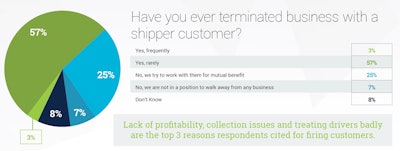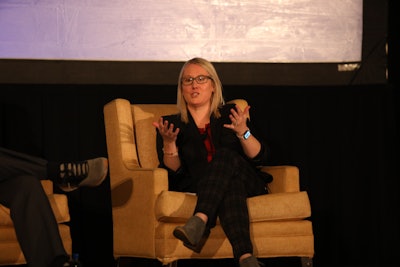 CCJ Editor Jason Cannon moderated a panel with Amanda Schuier from Quality Transport and John Miller with Plains Dedicated in Scottsdale, Nov. 18.
CCJ Editor Jason Cannon moderated a panel with Amanda Schuier from Quality Transport and John Miller with Plains Dedicated in Scottsdale, Nov. 18.“Hey dude, this sucks. I’ve got to tell you something.”
This is how Amanda Schuier starts a breakup conversation with unprofitable customers.
The audience laughed, but then she turned serious. “We are in such a delicate balance right now in terms of figuring out who we can move on from and who we can’t.”
According to a recent survey by CCJ, 57% of fleet respondents said they rarely terminate business with a shipper customer.
Schuier is senior vice president of Freeport, Ill.-based Quality Transport, a truckload carrier with 31 power units. On Nov. 18 in Scottsdale, Ariz., she participated in a panel discussion at the CCJ Solution Summit, “Moving on: lose the customers you are losing money with,” moderated by CCJ Editor Jason Cannon.
In 2018, motor carriers could afford to be selective of customers and shipments. In 2019, difficult decisions have had to be made, which can be even more excruciating for small fleets that need immediate cash flow by sticking to established customers, even when those customers are unprofitable.
As freight volumes dropped off in 2019, shippers’ attitudes are “probably that they are not going to have to pay decent rates until after the next presidential election,” said panelist John Miller, managing partner of Plains Dedicated, a motor carrier and logistics provider with headquarters in Championsgate, Fla.
“We all got giddy when rates went up [in 2018],” he said. “I think shippers felt like we burned them a bit.”
 CLICK to enlarge. According to a recent CCJ survey, 57% of fleets said they rarely terminate business with a customer.
CLICK to enlarge. According to a recent CCJ survey, 57% of fleets said they rarely terminate business with a customer.Schuier recently added sales to her list of job responsibilities. Before parting ways with unprofitable customers, Quality Transport tries to restructure the relationship where possible such as by divesting long-haul routes and retaining the customers’ regional lanes.
“We are still trying to maintain that relationship, but we are kind of letting them down slowly,” she says. It may not make sense to walk away completely, and in some lanes “we do take a loss…because maybe they are a customer that has a lot of freight with us.”
One strategy that has been working for Quality Transport is asking its unprofitable customers for permission to broker out loads to third-party carriers, she says.
Each month, Miller analyzes the revenue per mile by customer and lane to identify seasonal trends for Plains Dedicated. This helps the fleet plan ahead to find new customers and freight lanes before its business slows. He also looks at cost per mile and time for loads, along with other costs to determine when to cut ties with unprofitable customers.
Plains Dedicated, a refrigerated carrier, operates a fleet of 20 owner-operators. On average, the company cycles through its top three or four customers every 4.5 years. It is important, Miller noted, to “make sure every day you are developing new business…so you can walk away if you need to.”
 Amanda Schuier, senior vice president of Quality Transport, said the decision to lose a customer is a careful balancing act, even when business from the customer is not profitable.
Amanda Schuier, senior vice president of Quality Transport, said the decision to lose a customer is a careful balancing act, even when business from the customer is not profitable.Shippers who are unwilling to pay accessorial charges for detention, fuel surcharges, rebooking fees and other areas quickly rise to the top of Miller’s list of customers he wants to lose, and in the refrigerated business, “everybody knows” which shippers are notorious for not paying detention, he says.
Shippers that will allow the carrier to increase its linehaul rates to cover the costs they do not pay for as accessorial charges are the customers it will keep, he said.
The RFP process many shippers use to award lanes to carriers has eroded some of the relationships that have historically made it possible for Plains Dedicated to get rate increases, Miller said. RFPs are also very time consuming for carriers.
Miller believes the trucking industry will regain pricing power in the next two years, and when it happens, “the [shippers] who are doing RFPs, just run from them until they wake up. And when they wake up, just gouge them,” he joked.
Capacity may already be starting to tighten based on recent successes that Schuier and Miller have experienced when asking for rate increases. Schuier asked for two rate increases since September and got them both, she said. Likewise, Miller has gotten both quarterly rate increases he asked customers for this fall.
“People are aware that trucking is getting a little bit tighter,” Miller said.
 John Miller, managing partner of refrigerated carrier Plains Dedicated, is already seeing capacity tighten up based on recent success in getting rate increases from shippers.
John Miller, managing partner of refrigerated carrier Plains Dedicated, is already seeing capacity tighten up based on recent success in getting rate increases from shippers.Both Miller and Schuier expressed concern about rising insurance costs putting more carriers out of business. Many fleets will not be able to renew all of their tractors to keep the cost of their insurance down. “We are going to see a big crunch from everyone next year and the year after,” Miller said. “The people who survive are going to be able to afford insurance.”
Plains Dedicated renewed its insurance recently, and “it was not pretty,” he said.
Schuier said she is “intensely nervous about [insurance] renewals.” Quality Transport had a major accident this year and is anticipating a large increase in its premiums. “We are potentially looking at not renewing a couple of tractors. We are concerned about it and we are working to focus a lot on driver safety to help prevent [an increase] as much as we can,” she said.












